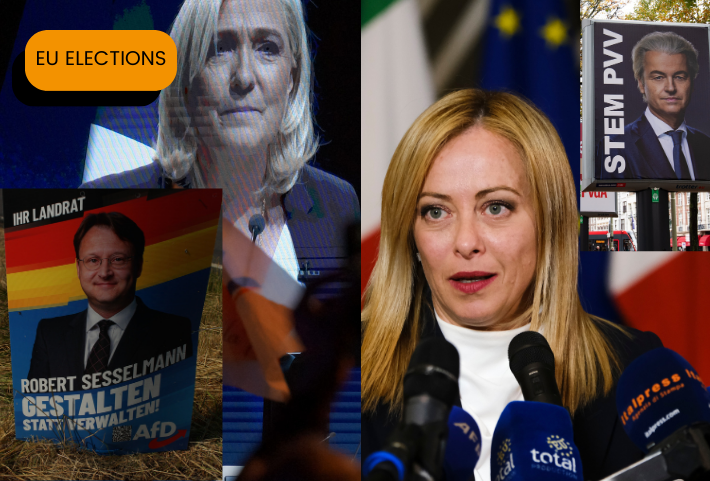By Angelo Boccato, freelance journalist
The media narratives around the far-right, especially in Europe follow a series of patterns that tend to repeat themselves. At first, there is a certain degree of alertness, not just for the far-right, but also for other forces seen as populists. After that, there is a feeling of wishful thinking that spells the end of the far-right and other forces seen as populists, followed by the progressive and misguided normalisation of the far-right. Such patterns become more and more evident before and after electoral cycles.
It was in 2016, with the unexpected victories of the Leave campaign (which was not entirely monopolised by the far-right, but had several right-wing and far-right elements and protagonists involved) in the UK referendum on EU membership and the election of Donald Trump in the United States, that these cycles entered the media debate in a groundbreaking way.

Those two political outcomes led to a widespread and global galvanisation of the far-right and populists; with Donald Trump running again in the US presidential race, Giorgia Meloni becoming the first Italian PM from the post-fascist tradition, and the European far-right poised for its best electoral result in June’s European elections. So, what is the state of the media debate on the matter?
The National Conservative Convention and the self-proclaimed freedom of speech defenders
The National Conservative Convention took place in Brussels on the 16th and 17th of April, organised by the Edmund Burke Foundation, a think tank with the “aims of strengthening the principles of national conservatism in Western and other democratic countries”.
The convention featured keynote speakers like Hungarian PM Viktor Orbán, the British Professor of Politics Matthew Goodwin, the French journalist and Reconquête leader Eric Zèmmour, former British Home Secretary Suella Braverman, and former UKIP and Reform UK leader Nigel Farage.
On the 16th of April, the convention was shut down by the Belgian police during Nigel Farage’s keynote speech, following an order issued by Emir Kir, the mayor of Saint-Josse-ten-Noode (a borough of the Belgian capital) “to guarantee public safety”.
Key speakers were outraged, with Braverman telling Sky News “I remember the words of Mrs Thatcher, but I am going to misquote her. ‘The more ridiculous, far-fetched and extremist their attempts to silence us are, the more cheered on I am, because it shows that they have lost the political argument’”.
There are two points to highlight around Braverman’s quote: the first one is that she was not silenced on that day at all, as she delivered her keynote speech (in line with the convention schedule) while the second and more important one is that this former Minister attempted to ban the right of protest in the UK, effectively breaking the law according to the largest UK civil liberties organisation, Liberty.
Farage also condemned the decision to shut down the convention during the same Sky News broadcast. He was also invited on the following day, April 17 on the breakfast talk show Good Morning Britain to comment on the event., Farage said “Three mayors in Brussels, in the course of the last three days, tried to shut down this conference. Very often people say cancel culture does not exist…well, it does”.
The right-wing TV channel GB News (where Farage is a presenter) gave ample coverage to the fact that the former British Member of European Parliament’s speech was interrupted, with NatCon organiser Frank Furedi saying “The future of democracy is in trouble”.
The Italian participant Francesco Giubilei, former advisor to the Minister of Culture Gennaro Sangiuliano, wrote in the Italian right-wing newspaper Il Giornale “Not even in Caracas or Pyongyang it is possible to witness similar things”.
The decision to shut down the conference during Farage’s speech was criticised by European leaders, including Belgian’s Alexander De Croo, the UK’s Rishi Sunak and Italy’s Giorgia Meloni.
Mayor Emir Kir pointed out on X that “ The far-right was not welcome in Saint-Josse-ten-Noode (the neighbourhood in the centre of Brussels, of which Kir is the mayor)”. While there are different views on Kir’s decision (it can certainly be seen as counterproductive and overzealous), what is certain is that the outcome led to a reinforcement of the narrative that right-wing and far-right voices are being silenced by the “politically correct-woke mob-elitès-cancel culture…” and any other group that supposedly leads the conversation. However, the conference proceeded and became much more relevant in the media than the organisers could have hoped.
The freedom of speech defender role is a card that the Right and far-right love to play but as far-right narratives have not only entered the mainstream but largely become the mainstream narrative, how disingenuous is this card?
Cancel culture on the Right-far-Right side: fiction and truth
Terms like cancel culture and politically correct are being used as clichès, applied to everything and nothing and devoid of any real meaning. If we look for instance at how pro-Palestinian voices are being silenced globally, from New York to Berlin, these cases represent a literal example of cancel culture, as a way of shutting down opinions that are not agreed with in the mainstream media and political discourse. Beyond the catchy headlines and the cheap indignation, where are right-wing and far-right voices exactly being silenced and not listened to?
Some media are helping certain views gain acceptability. Orbàn has amassed control of Hungarian media in a manner akin to Vladimir Putin in Russia, Giorgia Meloni has been taking control of Italian broadcaster RAI’s political line in an unprecedented way since the governments of Silvio Berlusconi, censoring unaligned voices, GB News in the UK and Fox News in the US support and provide a megaphone to some of the most extreme voices within the Tories and the Republicans, while socials like X have become more and more a nest of disinformation and far-right narratives, and a platform for those who voice those views.
The cancel culture denounced by the Right and the far-right is indeed fictional when it comes to them; on the other hand, their political designs for those who do not subscribe to their political visions are real. From allowing anti-abortion activists in Italian abortion clinics to the Tories’ plans of deporting asylum seekers to Rwanda (which parliament voted into law on 22 April) it is more and more complex to distinguish the differences between the Right and the far-right, as basic principles in terms of rights and personal freedoms for minorities, marginalised and non-aligned groups are seen to be stepped on.
While the Tories are not part of the far-right galaxy as such, another important element of recent years is the fact that the divide between the Right and the far-right in terms of narratives and policies has become quite blurry, making them often indistinguishable. The synergy between Giorgia Meloni and Rishi Sunak is a testament to that.
Mainstream media has a huge responsibility for the normalisation of such narratives and characters. Aurelien Mondon, Senior Lecturer in Politics at the University of Bath wrote in The Conversation “It should be obvious to anyone concerned about these politics and the threat they pose to democracy and certain communities, that humanising their leaders through fun reality TV shows or coverage of their hobbies rather than politics only serves to normalise them”.
“…This therefore leaves us with the need to reckon with the crucial role the mainstream plays in mainstreaming. Elite actors with privileged access to shaping public discourse through the media, politics, and academia are not sitting within the ramparts of a mainstream fortress of good and justice besieged by growing waves of populism.”
Cas Mudde, Stanley Wade Shelton Professor in the School of Public and International Affairs at the University of Georgia, Professor II at the Center for Research on Extremism at the University of Oslo, and author of The Far Right Today wrote in VoxEurop “Despite all the antics on both sides, the media and the far-right are frenemies. Sure, the far-right loves to attack the media as “fake news” or even “Lügenpresse” (lying press), while the media love to write articles about the “dangers” of the far-right, but this masks a highly symbiotic relationship that is mutually beneficial.”
“As a vocal critic of media coverage of the far-right, I am often asked how the media should cover them. This is a complex issue for a variety of reasons. One is that there is a big tension between how the media are seen by many journalists and readers and what they are. The idea that the media are the watchdog of democracy is popular, including among journalists, but the reality is that almost all media are businesses. Consequently, they ultimately have an economic, not a political or democratic, logic. Which explains their symbiotic relationship with the far-right. This is not to say that things cannot be improved” Mudde continues.”
The points made in Mudde’s conclusions are central: “In general, the media are overly critical, if not outright hostile, to the far-right when they are politically marginal, but much less so when they become politically relevant. What we really need, now more than ever, is a media that understands and acknowledges the threat of the far-right to liberal democracy (and, thereby, to an independent media) and that covers the far-right in an informed and critical way.”
In a crucial election year like 2024, it is fundamental to support diverse voices and independent media in portraying the far-right for what it is, by not falling into traps around freedom of speech debates (the far-right galvanises hate speech, which has nothing to do with free speech), but by underlining patterns, highlighting similarities and observing the policies pursued or enacted. The far-right normalisation has already caused enough damage.

Pictures from shutterstock.com
Disclaimer:
The views and opinions expressed in this article are solely those of the author and do not reflect the official policy or position of the Media Diversity Institute. Any question or comment should be addressed to editor@media-diversity.org
